WHO BETTER to be our Hybrid issue cover centaur-the mythical half-man, half horse-than writer, filmmaker, musician, professor and all-around thought-provoker Kip Fulbeck. Along with his Cantonese, English, Irish and Welsh background, Fulbeck represents what we were aiming for with our Hybrid issue: A multidisciplinary approach to life. While working on "The Hapa Project," Fulbeck traveled across America and took headshots of some 1,200 people-116 of which ended up in Part Asian, 100% Hapa (Chronicle Books). In between shots at our magical photo shoot, we sat down with Fulbeck to ask him about his work and what it's like to have the mind of a human and the body of a stallion-and other pressing questions.
What did you learn while doing "The Hapa Project"?
Doing the hapa book, I saw people all over the country that supposedly had this similarity because we're all quote-unquote multiracial...but there's nothing in common really. The [book] shoots would be electric in the beginning: four people would show up and they'd be like Oh my god, what are you? And I'm this too.' But if you put us on an island, we'd kill each other because there's no commonality except that we live in a country that insists on using race to define you and we've all had to fight against that. That's the only thing that I think we really share. After that it's just as diverse as any group of people. Race is a social construct that our country happens to get really, really into. I would love not to have had to make that book but we live in a country that's overly focused on it. That's why, in the hapa book, I let them pick their own way to describe themselves. Those are their categories because it's a space to say whatever we wanted.
In what ways do you see the perception of hapas changing in American culture, or not changing?
One thing that is changing is that people are finally starting to get a grip that there are actually millions and millions of people who are multiethnic-or I should say multiracial because they believe race is a real thing. Although a couple 20,000 people are sophisticated, have read their histories and dealt with their identities-the vast majority of the world has never even thought of this. Sometimes people ask me: 'You're still doing that subject?' But I haven't even touched the tip of it.
How do you respond when someone asks you what your race is?
I don't really have a problem. I'm 42 now, so I'm not at this angry stage of my life where I'm ready, walking around armed all the time. As long as the question is done with respect and they're willing to answer the question themselves-if those two conditions are met, I'm totally fine having that conversation. It's when someone comes up and they've got the dreamcatcher hanging in the car and they've got the Native American headdress and they go 'Are you part Native?' and I tell them no, and they're like Oh.' And I say, 'Well what are you?' and they say, 'Well I'm just white' and walk off. I have a problem with that because they don't want to share.
Do you think there's a fetishlzation of hapas?
Of course and it's not just by mainstream; it's within the API community too. Asian men are coming into vogue now-with Yul on Survivor people are suddenly like 'Asian men are kinda sexy;' all of a sudden they put a few in the 50 Most Beautiful People list. We're just the soup du jour-that's someone's issue and I don't care about that. -Melanie Colburn









Comments